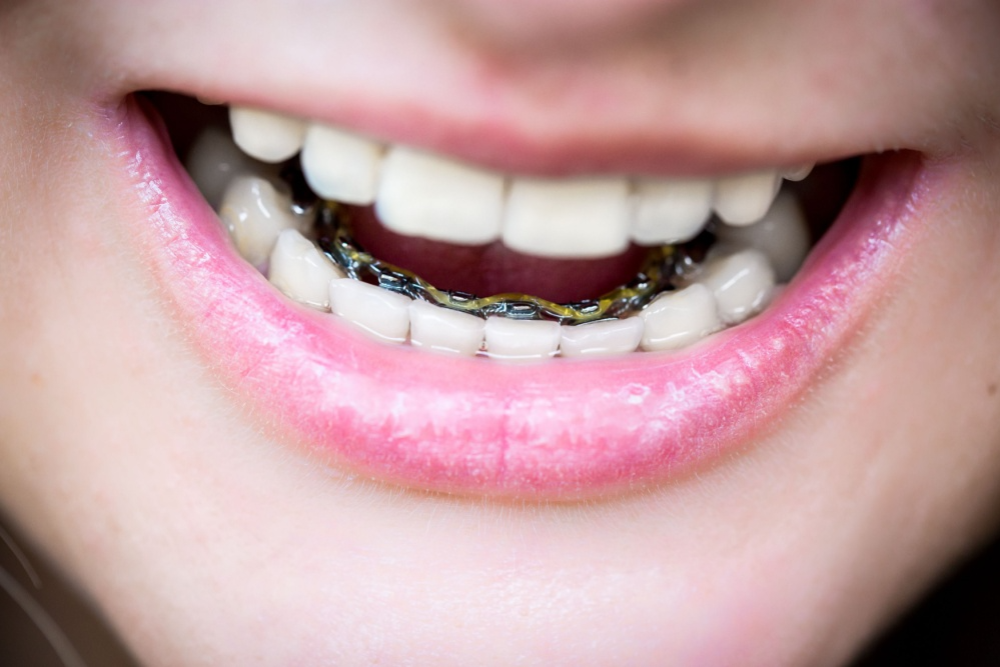We are having a short break over Christmas. Please click here for any orthodontic emergencies.
We are having a short break over Christmas. Please click here for any orthodontic emergencies.

Lingual braces are a discreet orthodontic treatment that is virtually invisible. Orthodontists attach the brackets and wires to the back surface of teeth instead of the front of the teeth. The result is an almost invisible orthodontic treatment. Lingual braces are a popular option for those who want to enhance their smiles with a treatment that isn’t visible to others.
Lingual braces work in a similar way to conventional braces. An archwire connects the brackets to reposition crooked or misaligned teeth gradually. Using a detailed treatment plan, your orthodontist carefully plans and adjusts the position of each tooth during treatment.
As treatment progresses, archwires and elastics are replaced to ensure continued improvement in the position and alignment of teeth. Once treatment is complete, a retainer helps to keep teeth in the optimal position.
Visiting an orthodontist is the first step in understanding if lingual braces suit your case and circumstances. Your orthodontist will carefully assess the following elements to determine the best treatment:

The average cost of lingual braces is usually a little higher than normal braces. The differences that contribute to the price difference include:
Overall, lingual braces treatment is more complicated and results in a higher treatment cost when compared to traditional braces.
All orthodontic appliances affect speech initially. Positioned between the tongue and teeth means lingual braces can affect the way we pronounce certain words and sounds. Most patients find it easy to adjust to lingual braces. However, some patients may have difficulty speaking initially.
Patients who play woodwind instruments may find it easier to adjust to lingual braces than regular braces.
Most braces will cause some initial discomfort. Generally speaking, there are 2 types of discomfort with braces. This typically lasts for a few days and can be managed with over-the-counter pain medication if required.
Tooth and gum aches are common for most patients following the initial application of braces. This is caused by the continuous pressure applied to move the teeth into the desired position. This discomfort typically only lasts a few days and is well tolerated by most patients. A similar discomfort may be experienced following adjustments and is a normal part of orthodontic treatment.
Choosing soft foods can help to reduce the severity and duration of discomfort. Over-the-counter pain medication can be used to manage the discomfort as needed.
Soft tissue soreness is common for patients with lingual braces. Most patients find this improves significantly following the adjustment period. Orthodontic wax is an effective way to smooth sharp edges and reduce tongue soreness. Patients with higher levels of sensitivity can use warm salt water rinses to soothe irritation during the adjustment period.
The main benefit of lingual braces is that they can straighten teeth while being almost invisible. This is the most important consideration for many patients when choosing from the range of orthodontic treatment options. The main disadvantage is they are more expensive and can cause more discomfort than traditional braces or clear aligners.
If you’d like to speak to our orthodontics about the advantages of lingual braces, speak to our team today.
MP Orthodontics is an orthodontic practice based in Cheltenham, Melbourne. Working from the belief that orthodontic treatment is much more than working with teeth and creating smiles, treating orthodontists – Dr Martin Poon and Dr Geoff Hall – approach patients as people first. Their approach is to work together and plan and implement treatment that meets each individual’s needs. Drawing on 30-plus years of experience of helping children gain confidence through tailored treatment, MP Orthodontics is a truly unique orthodontic practice.
Book a consultation with MP Orthodontics to begin your orthodontic journey.
Monday to Friday: 8:00 am - 5:30 pm
Saturday & Sunday: Closed